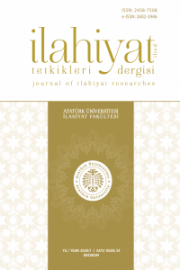Federal Almanya’daki İlkokul (1.- 4. Sınıflar) Çocuklarla Felsefe Dersi (Philosophieren mit Kindern) Öğretim Programının Değer Eğitimi Açısından İncelenmesi
An Investigation of “Philosophy with Children” Lesson (Philosophieren mit Kindern) Curriculum in terms of Values Education at Elementary Schools (1st - 4th Grades) in the Federal Republic of Germany
Author(s): Halise Kader ZenginSubject(s): Philosophy, Social Sciences, Education, School education
Published by: Atatürk Üniversitesi İlahiyat Fakültesi
Keywords: Religious Education; Values Education; Philosophy with Children Class; Germany; Primary School Curriculum;
Summary/Abstract: Philosophising with children is a discipline that gives children reason, questioning, and critical thinking. This discipline teaches children not to accept the information, beliefs and moral values they encounter without questioning them and to make choices by making evaluations. The leading names in philosophing with children whose foundations date back to the 1970s are known as Matthew Lipman and Gareth B. Matthews. One of the research areas of philosophy is the philosophy of values (Axiology). Moral Values that form the basis of individuals' behavior have different definitions and classifications. However, countries attach more importance to values education day by day. One of the areas that will contain values education should be Philosophy Courses with Children. In this study, the Philosophy Lesson with Children, which is the subject of teaching, is aimed to be examined in terms of moral values education. The main question of the research is: "Does the "Philosophy with Children" curriculum at primary schools (1st-4th grades) in Federal Germany have a connection with Moral Values Education?". A qualitative research was carried out in this study. Document analysis was preferred in the analysis of the data. Findings are interpreted by making content analysis. As a result of the research, this course is directly related to moral values education; It is concluded that it has the goal, competence and content that brings values such as being free, choosing its own goals, being open-minded, asking for peace, and having responsibility.
Journal: İlahiyat Tetkikleri Dergisi
- Issue Year: 2020
- Issue No: 53
- Page Range: 287-307
- Page Count: 17
- Language: Turkish

